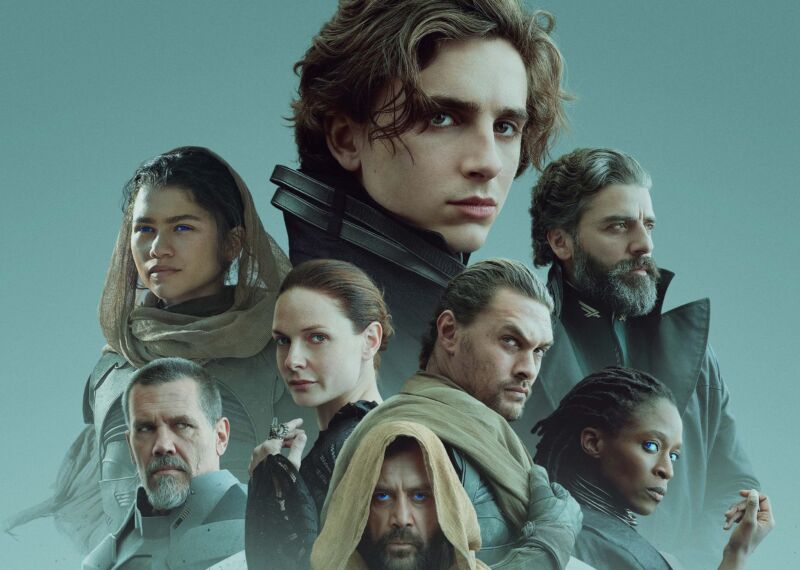
I left my first screening of Dune (2021) convinced that I would watch it again soon.
For a film that spends much of its time in a barren desert wasteland, Dune's cinematography consistently dazzles. And despite a sizable cast of seemingly important characters, Dune does a good job establishing empathy and likability across the board—without losing the story's thread. Lead actor Timothée Chalamet also comfortably surmounts whatever massive expectations series fans might have about the Dune universe's latest "chosen one."
But that's not to say it's a perfect or even great film—a fact that shouldn't necessarily ring alarm bells for anyone familiar with David Lynch's cult-favorite effort. And while Denis Villeneuve's ambitious take is certainly anchored in a familiar story, marked by identical storytelling beats, it works hard to differentiate itself from the 1984 film, as if to make it easier for fans to love both of them.
The new Dune has something for everyone to embrace, gasp at, sink their teeth into, and be utterly annoyed or puzzled by. Something so bold yet mixed feels all too appropriate for a beloved but unwieldy storytelling series like Frank Herbert's.
From here on out, expect spoilers—and saltiness about the ending
-
Paul (Timothée Chalomet), the heir of House Atreides, salutes you.
-
A vision of a mysterious woman on a desert planet.
-
Paul Atreides (Timothée Chalamet) wonders what his dreams might mean.YouTube/Warner Bros.
-
A spot of combat training.YouTube/Warner Bros.
-
Oscar Isaac plays Duke Leto Atreides.YouTube/Warner Bros.
-
Rebecca Ferguson plays Lady Jessica, the Duke's Bene Gesserit concubine.YouTube/Warner Bros.
-
Jason Momoa is welcome casting for Duncan Idaho.YouTube/Warner Bros.
-
Greeting visitors in state.YouTube/Warner Bros.
-
This is Gurney Halleck's (Josh Brolin) smiling face.YouTube/Warner Bros.
-
Zendaya plays Chani, the woman from Paul's visions.YouTube/Warner Bros.
We'll start at the ending, because if you're invested in Dune at all, you've likely already heard about how this film ends. Be warned: As a review of the latest Dune remake, this review will include plot spoilers. Now is a good time to stop if you've somehow missed all things Dune since the franchise's first book came out in 1965.
The new film, which was slated to launch as far back as November of last year, is advertised on posters as Dune, but as the opening credits roll, its true title emerges: Dune, Pt. 1. This is likely the moment viewers will remember the film's 2 hour 35 minute runtime and wonder how its plot might shake out, as compared to Lynch's take, which somehow blew through Herbert's entire first tome in only 137 minutes.
Arguably the most crucial difference is when Villeneuve's version stops: at a far-from-pivotal moment. Paul (Chalamet) and his mother, Jessica (Rebecca Ferguson, multiple Mission: Impossible films), have escaped great peril and fled alone into the sands of the planet Arrakis, also known as Dune, when they're happened upon by mysterious and anxious Fremen warriors. The sequence that follows is one that Lynch filmed but the original theatrical cut skipped: Paul's deadly duel against a warrior named Jamis, who had appeared in Paul's dreams. One of the two men must die, Jamis insists.
As an authentic representation of the original novel's conflict, this scene is arguably fine in isolation. It's a reasonable morsel of Paul's progression from confused, uncertain protagonist to something much bigger. But as a climactic, film-ending battle, it lands like a wet, spice-filled sock. In this scene, his mother narrates its import, informing viewers that Paul has never killed anyone before. Yet maybe 25 minutes earlier, he and his mother incapacitated and killed their captors, which neuters this tell-don't-show attempt to give the film's final, stabbing thrust more weight.
The tricky guesswork of box-office economics and HBO Max
Worse, the rest of Dune does very little to sell how important or tone-changing this single battle might be. Paul clearly has a ways to go to bond with and take charge of this world's Fremen population. The glimpses we get of Paul’s lucid dreams suggest he might die in this fight, and he does—figuratively. Yet the scene doesn’t end with him appearing reborn as a new man. Instead, it lands with the soft sound of closing a book before going to bed, not the hard slam of a riveting cliffhanger.
This is probably the point when Villeneuve, sitting next to you in a theater, might whisper, "Don't forget, this is only part one! There's more to come!" But we don't know that for sure.
Warner Bros. has yet to formally greenlight production of Dune Pt. 2, and the project has lost an entire year of momentum to a COVID-induced delay. Box-office receipts are promising in regions where Dune has already premiered, but it's unclear how the Warner Bros. empire, currently mid-acquisition, will weigh the film's performance in the US, where it launches in both theaters and HBO Max on the same day.
What's the magic number of ticket sales and subscribers that will excite the bean counters enough to sign the right checks and get Dune Pt. 2 in the works? That rhetorical question, sadly, might affect how you feel about Pt. 1's ending. Its abruptness, among other things, relegates the character of Chani (Zendaya, various Spider-Man films) to brief, hazy flashes in Paul's dreams. Should Pt. 2 never get made, Zendaya will forever be the Dune character who appeared almost entirely as a loop of roughly 20 seconds of repeating visions. And that says nothing of the folks who come to this year's film hoping to see some wicked sandworm-riding sequences. (In Pt. 1, we only get the tiniest hint of this mode of transportation.)
reader comments
614